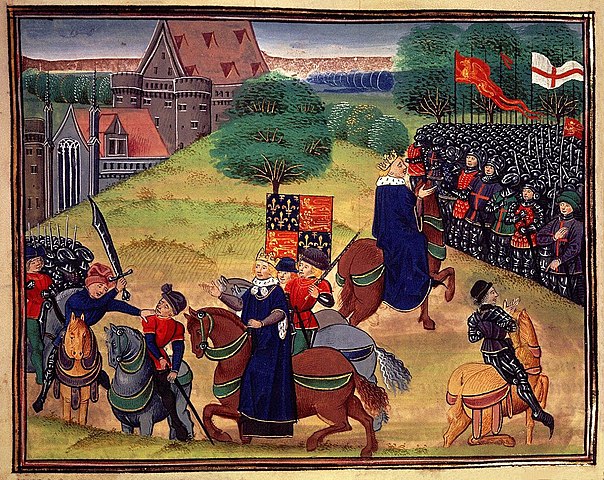
The Peasants' Revolt of 1381 is mentioned in the Canterbury Tales.
A tale of two stories
by Tom Sullivan

The Peasants' Revolt of 1381 is mentioned in the Canterbury Tales.
Sen. Elizabeth Warren of Massachusetts is already flexing her political muscle to influence hires by a prospective Hillary Clinton transition team, according to Vanity Fair. She has put together a coalition aimed at ensuring Clinton hires progressive thinkers and policymakers:
In Warren’s “hell no” category for appointees are corporate executives with ties to the industries they would be regulating, and individuals with strong ties to Wall Street, Politico reports. That would exclude Clinton friends like Robert Rubin, who held top positions at both Goldman Sachs and Citigroup before serving as treasury secretary for Bill Clinton, or Michael Froman, who worked on Barack Obama's transition team while still on Citigroup's payroll. Instead, Warren reportedly hopes to line Clinton’s cabinet with a number of strong left-leaning liberal voices. And the senator’s efforts have already begun to pay off. The Democratic Party has reportedly adopted the Warren’s guideline that only those “who are not beholden to the industries they regulate” should receive appointments, Politico reports, and this week Clinton hired two Warren-approved progressives for her transition team, Heather Boushey and Rohit Chopra.The source of Warren's clout gets lost in the process discussions. Warren's is a powerful voice because she connects with audiences in a way few Democrats do. She tells stories, stories about families' struggles, about corruption in high places, about an economic system designed by the powerful for the powerful, and that defends a system of inequity working people don't just read about, but feel in their bones.
These right-wing media stars don’t sell their audiences conservatism, nationalism, populism, or any “-isms” at all. They are entertainers. They sell conspiracy and innuendo. They sell outrage and grievance. “The ideal CNN story is a baby down a well,” wrote Rolling Stone’s Matt Taibbi, “while the ideal Fox story is probably a baby thrown down a well by a Muslim terrorist or an ACORN activist.” If you have a problem in your life — if you’re scared or anxious or feel that you’ve been treated unfairly — people like Hannity and Drudge and outlets like Breitbart tell you where to direct your blame. They tell you who deserves your suspicion. And it’s always people who are different than you — either they’re richer, more powerful, and therefore corrupt, or they don’t look like you, pray like you, speak like you, or come from where you do.Trump has tapped into a narrative with a ready-made audience. Favreau writes, "Trump talks like a true talk radio fan — longtime listener, first-time caller. He comes off like the winner of a reality TV show in which one lucky Fox viewer gets picked to run for president of the United States."
... we should also remember that Trump is a media celebrity who’s been coached to tell a certain story about America, and the best way to counter that is with a story of our own. It’s the story that was told at the Democratic convention by Hillary Clinton, who laid out a bold, optimistic vision for a future where we rise together. It’s the story that was told by Barack and Michelle Obama, who spoke of a country that’s hopeful and generous; tolerant and kind — a place where we teach our children to treat one another with common decency and respect. It’s the story told by Khizr and Ghazala Khan, a family of Muslim immigrants who struggled and sacrificed to make a home in America, and raised a courageous son who gave his life for the country he loved. It’s a story that sometimes makes us roll our eyes because we’re hardened and cynical and we let ourselves believe that fear and anger are the only emotions that leaders can use to inspire anymore. But it’s a story that must be told, over and over again.Twice in two days, the press-shy Clinton answered questions for reporters on her campaign plane, breaking with her habit of keeping the press corps at arms length. She is showing a willingness to adapt to a changing campaign landscape. Perhaps she can bring some Warren kick to the final sprint. Trump's narrative succeeds because his audience already knows it. He's connecting with them, as Warren does, by telling their own story back to them. Clinton needs to make that connection, as she reportedly does well one-on-one.